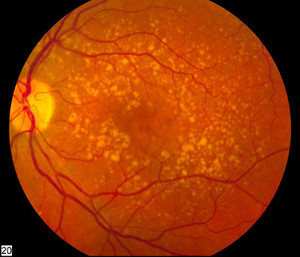Byooviz (SB11) is the first ranibizumab biosimilar approved by the US Food and Drug Administration (FDA) and European Medicines Agency (EMA) [1, 2].
In the US, Byooviz (ranibizumab-nuna) is approved for the treatment of neovascular age-related macular degeneration (nAMD), macular oedema following retinal vein occlusion (RVO), and myopic choroidal neovascularization (mCNV). In Europe, Byooviz is approved for the treatment of nAMD, visual impairment due to diabetic macular oedema (DME), proliferative diabetic retinopathy (PDR), branch RVO or central RVO and CNV [1, 2].
The approvals were based on totality of evidence including analytical, non-clinical and clinical data.
A randomized, double-masked, multicentre phase III study was carried out evaluating the efficacy, safety, pharmacokinetics (PK) and immunogenicity of SB11 compared to reference ranibizumab (RBZ) in patients with nAMD [3].
A total of 705 participants were randomized 1:1 to receive either 0.5 mg SB11 or RBZ in monthly intra-vitreal injections and 634 participants completed the study up to Week 52. Primary endpoints were analysed using an analysis of covariance and equivalence was declared if the two-sided 90% confidence interval (CI) of the difference of the mean change from baseline in best corrected visual acuity (BCVA) at Week 8 between two treatments was within the pre-defined margin of ±3 letters for FDA. For EMA, equivalence was declared if the two-sided 95% CI of the difference of the change from baseline in central subfield thickness (CST) at Week 4 between two treatments was within the pre-defined margin of ±36 μm. Secondary endpoints were long-term efficacy, including change from baseline in BCVA, CST, central retinal lesion thickness, total CNV size, the proportion of participants with active leakage and safety up to Week 52. Blood samples for PK and immunogenicity were assessed at each time point at Weeks 0, 1, 4, 8, 16, 24, 36 and 52.
The primary endpoints for the study were met; the change from baseline in BCVA at Week 8 showed an adjusted treatment difference of −0.8 letters (90% CI: −1.8 to 0.2) and the change from baseline in CST at Week 4 showed an adjusted difference of −8 μm (95% CI: −19 to 3), which were fully contained within the pre-defined equivalence margin. This comparability was maintained up to Week 52, as the change in BCVA from baseline at Week 52 showed an adjusted difference of -0.6 letters, (90% CI: -2.1 to 0.9) and the change in CST showed an adjusted difference of -15 μm (95% CI, -25 to -4). The similarities in PK, safety and immunogenicity profiles were also maintained at all time points up to Week 52.
Experience has shown that biosimilars in other fields of medicine can contribute to reducing healthcare costs and improve patient access to therapies. With SB11 and several other biosimilars under development, the availability of biosimilars may have a major role in ophthalmology through cost savings and increased patient access, which may help reduce the financial burden of healthcare systems as well as the blindness from nAMD.
Conflict of interest
The author of the research paper [1] reported conflict of interest, including having received grants from pharmaceutical companies. For full details of the authors’ conflict of interest, see the research paper [1].
Abstracted by Dr Se Joon Woo Professor at the Department of Ophthalmology, Retina Bio & Data Science Center, Seoul National University Bundang Hospital (SNUBH), South Korea and Director of Medical Device Research and Development Center, SNUBH.
GaBI Journal Citation Impact
1.9 – CiteScore 2020 (calculated on 5 May 2021)
2.2 – CiteScoreTracker 2021 (Last updated on 6 March 2022)
Submit a manuscript to GaBI Journal
Related article
Biosimilars of ranibizumab
| LATIN AMERICAN FORUM The new section of the ‘Latin American Forum’ on GaBI has been launched. The objective of this new section is to provide you with all the latest news and updates on developments of generic and biosimilar medicines in Latin America in Spanish. View this week’s headline article: Biocomparables aprobados en México Browse the news in the Latin American Forum! Register to receive the GaBI Latin American Forum newsletter. Inform colleagues and friends of this new initiative. LATIN AMERICAN FORUM Se ha lanzado la nueva sección del ‘Foro Latinoamericano’ sobre GaBI. El objetivo de esta nueva sección es brindarle las últimas noticias y actualizaciones sobre desarrollos de medicamentos genéricos y biosimilares en América Latina en español. Vea el artículo principal de esta semana: Biocomparables aprobados en México !Explore las noticias en el Foro Latinoamericano! Regístrese para recibir el boletín informativo GaBI Foro Latinoamericano. Informe a colegas y amigos sobre esta nueva iniciativa.
|
References
1. GaBI Online - Generics and Biosimilars Initiative. Biosimilars approved in Europe [www.gabionline.net]. Mol, Belgium: Pro Pharma Communications International; [cited 2022 Apr 8]. Available from: www.gabionline.net/biosimilars/general/biosimilars-approved-in-europe
2. GaBI Online - Generics and Biosimilars Initiative. Biosimilars approved in the US [www.gabionline.net]. Mol, Belgium: Pro Pharma Communications International; [cited 2022 Apr 8]. Available from: www.gabionline.net/biosimilars/general/Biosimilars-approved-in-the-US
3. Bressler NM, Veith M, Hamouz J, et al. Biosimilar SB11 versus reference ranibizumab in neovascular age-related macular degeneration: 1-year phase III randomised clinical trial outcomes. Br J Ophthalmol. 2021 Oct 16:bjophthalmol-2021-319637. doi: 10.1136/bjophthalmol-2021-319637. Epub ahead of print.
Permission granted to reproduce for personal and non-commercial use only. All other reproduction, copy or reprinting of all or part of any ‘Content’ found on this website is strictly prohibited without the prior consent of the publisher. Contact the publisher to obtain permission before redistributing.
Copyright – Unless otherwise stated all contents of this website are © 2022 Pro Pharma Communications International. All Rights Reserved.








 0
0











Post your comment